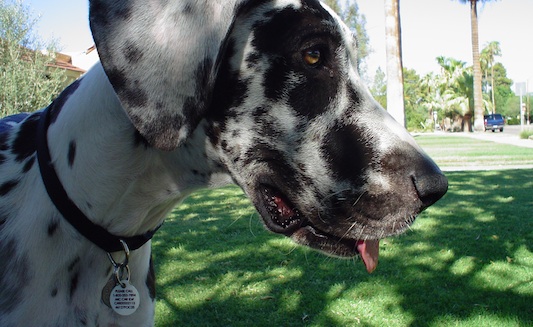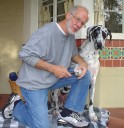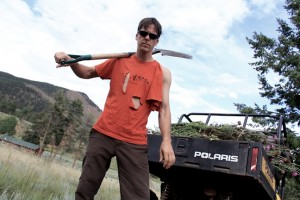The Sustainable Solutions Paradigm
Beauty in Balance
Sustainable living begins with self-awareness and takes form in the resulting actions.
The awareness starts, for me, by reintegrating the natural and human worlds. Since ancient times humans have worked to isolate themselves from the animal world, from the “natural” world. In an effort to control our surroundings, to rise as the dominant species, we have justified our manipulation of the world in so many forms. Sometimes this is overt and deliberate, but mostly it is subtle, underpinnings in our shared vocabulary and cultural norms developed over time.
In the U.S., we need to undo a great deal of what the Industrial Revolution set in motion, then amplified by the technological revolution following WWII.
We have a misconception of living outside the natural world. I hear it often said “I want to get back to nature” or “we need to spend more time in the natural world” or even “out in nature” as though it is over there somewhere, on the other side of that ridge or that line of trees—but not here, where we stand, breathe, and live.
Even worse are the phrases “Save the environment!” or “Save the planet!” as both perpetuate the mistaken belief that “the environment” is an isolated thing, something we are not a part of but need at some level. We have relegated the rebalancing of our place in our ecosystem to that of saving a certain species of dolphin from extinction.
This planet will get along just fine with or without any given species. It will find a new balance in time. The issue is truly about whether or not we desire to live in relative balance or constant struggle with the resources available to us, and whether we find beauty in a world untouched by human hands, or one entirely under our domain. As so few of these untouched places yet exist, our domain is for a growing population, all they will know in their lifetime.
Spaceship Earth
Contrary to the beliefs of Buckminster Fuller and many of his contemporaries of the 1950s who had survived two world wars and saw this planet as plentiful, the Moon within reach, our resources are in fact quite limited and mining the Moon remains the work of science fiction. The more people we support, the less resources we have available for each of us.
Sustainability is truly about resource allocation and bioregeneration, in the end.
We are in all that we do, with every breath of our bodies and every acceleration of our automobiles, with every release of toxins at both a cellular level and from our industrial plants, involved in a constant interaction with our shared environment.
Before this begins to sound too mystical, I am speaking at a very real macro and micro level. I am speaking of the movement of molecules from one medium to another, and how our actions affect the many ecosystems we do embrace as our home.
The key is this—there is no right or wrong in our actions. There is only sustainable and unsustainable, meaning, to continue as we are, now, or to transition to a new paradigm of decreased, per capita resource consumption.
Unlike any other species on the planet, our opposable thumbs have enabled us to manage every level of our functional interaction with the world from which we take and to which we give.
I just want my milk
Let’s look at one product, one which we have harvested for more than ten thousand years–milk.
In small scale production, the cow consumes the grass which grows in the immediate field. The farmer walks from the farm house to the barn which houses the cow. The cow is manually milked. The milk is returned to the farm house, consumed, or perhaps processed into various milk products by way of heating, spinning, and filtering. The resources consumed are minimal, mostly local (outside of what is required to heat the farm house, which is a common denominator in this equation), and sustainable given the immediate rainfall, sunlight for the hay to grow.
When we purchase a carton of milk via industrial farming, we take advantage of a complex chain of events which includes the use of non-renewable resources: we pump oil from deep underground reserves, process the petroleum distillates to not only power the tractor which harvests the hay, corn, and soy which feed the cattle, but also the manufacturing of the tractor itself, the construction of the building in which the dairy cows are contained, and transportation of the milk to the plant which separates, sterilizes, and packages that which we eventually drink.
Each ounce of milk is made available to us by way of pesticides, herbicides, and hormones which enable a higher yield of milk product per acre than was possible just one human generation ago. All of this is possible due to the release of carbon based energy which will not in the lifespan of our species again be replenished.
Each plastic jug is made from the same petro-chemicals as are the herbicides, pesticides, and fuel used to harvest, store, and transport the grain. The alternative cardboard container is made from trees whose wood pulp is processed using massive amounts of water, digestive and bleaching agents, hydraulic presses, and glue to hold it altogether again. The ink is either petro-chemical based, or in food grade products, likely made from a soy product which is again a product harvested by the same means as that which feeds the cattle.
This is a light treatment of the subject, for truly, a single gallon of milk is the result of tens of thousand of individuals who made each component of the process possible. It is only with the economies of scale that such an endeavor can result in milk delivered to your grocer for less than $3.00. The real cost is almost incalculable, on a global scale.
Do I suggest elimination of technology and mass production in favour of manual labour and small, independent farms? No, but at least recognizing the total cycle and the real consumption of resources brings us back to the question of sustainability.
How long can we persist at this rate? How much of an impact does this multi-faceted, mass production system have on our fully integrated world where there are no barriers between our species, our actions and the environment?
If we accept that there is no bubble, no glass dome, no boundaries of any form which keep us from that which we think of as being over there, then sustainability is not just about recycling your glass bottles, choosing biodegradable containers, or mulching yard clippings, but yes, it can start there.
Sustainability is in some respects a waking, walking, breathing awareness in which we do not take anything for granted. With each product we buy, we make the conscious choice to examine the ingredients, to examine the packaging, and to choose the contender which was delivered to us with the least overhead—quite literally, the path of least resistance.
In the case of milk, we may choose home delivery of fresh, local milk in a glass container. Not only do we cut the real cost of packaging to a minimum by reusing (which is always better than recycling), but we once again build a relationship with the product and the humans who provide it.
This is but one story, but one example for which I could provide thousands for each product we purchase, use, and then discard. The overwhelming nature of this is clear demonstration just how far removed we have become in two, maybe three generations. Many people choose to hold their hands over their ears, shake their heads, and exclaim “It is too much to think about. I don’t want to know how it all works! I just want my milk!”
Disconnection
Therein lies the source of the problem. When we were hunter-gatherers every person shared the knowledge and experience to survive, as an individual or in a collective, shared tribe. As we transitioned to agrarian we became masters of resource allocation, specialization, and our populations expanded. Only in the past fifty years did we again transition to a technological foundation and in so doing, became fully removed, as individuals, from most of what we consume. There is such an elaborate, complex story behind nearly every product we buy that we cannot possibly understand nor appreciate what makes delivery of that product possible.
How many people in the U.S. have ever pulled a fresh carrot from the ground? Sewn their own clothing, or chopped the head off a chicken, pulled its feathers, and prepared it for a meal or storage?
Everynowandagain we are surprised to learn that twelve year old girls in China are assembling our cell phones, or that our fast food is comprised of more synthetic compounds than real flesh and bone. It is these harsh reality checks that help to rebalance the equation, to remind us that economies of scale do not always lend themselves to sustainability for they are not in isolation.
This is precisely how we can point somewhere over there and say, “That is nature” when in fact we are standing in nature at all times. To be sustainable, we must make individual choices which reduce our total consumption. This will in effect, over time, modify our collective consumption and our cultural norms.
If we do not proactively make these choices, “nature” will take us down that path without our consent, not as punishment but as part of the inevitable feedback loop in which we do exist.
My own choices, my own actions
I have been traveling across North America and overseas for the past two years. I seldom eat at restaurants. Whenever possible I purchase from someone as close to the source as possible. I am vegetarian for more than twenty five years and while I am by no means against eating meat, there are simply too many people on the planet to make meat centerpiece to each meal. I carry with me my own fork, knife, spoon, and cup and refuse, whenever possible, to eat from disposable dishes. I never accept bottled water. Even in Kenya, I purchased a water filter for my adopted children in order that they might reduce their impact (and it will save nearly $100 USD in the first year).
I know this invokes the image of dreadlocks and baggy, unwashed clothes, but I am a working, well groomed professional. I am, quite literally living as my grandparents did just two generations before me. They carried their own dishes to picnics and family reunions, and at the end of the day, brought them home again. We have become complacent, a throw-away society disconnected from our own actions.
Sustainability can be as simple as asking yourself, “How would my grandparents have done it?” The answer is usually a sustainable one.
On a personal level, sustainable action just feels right. To not live at least attempting sustainability is to perpetuate the false belief that we are, as individuals and as a species, somehow insulated from the total world. I don’t want to live like that. It is not healthy for me, for those with whom I interact, nor those whom I will never meet.
My advice, if it is received, is to not draw lines of black and white. Find instead shades of gray. Make small decisions, incremental steps toward living with improved awareness. Practice, but do not preach. Share what you have learned when someone asks, but do not push it on them. Be an example, and people will want to follow. And that is how the total system can change, one person, one consumer at a time.

















